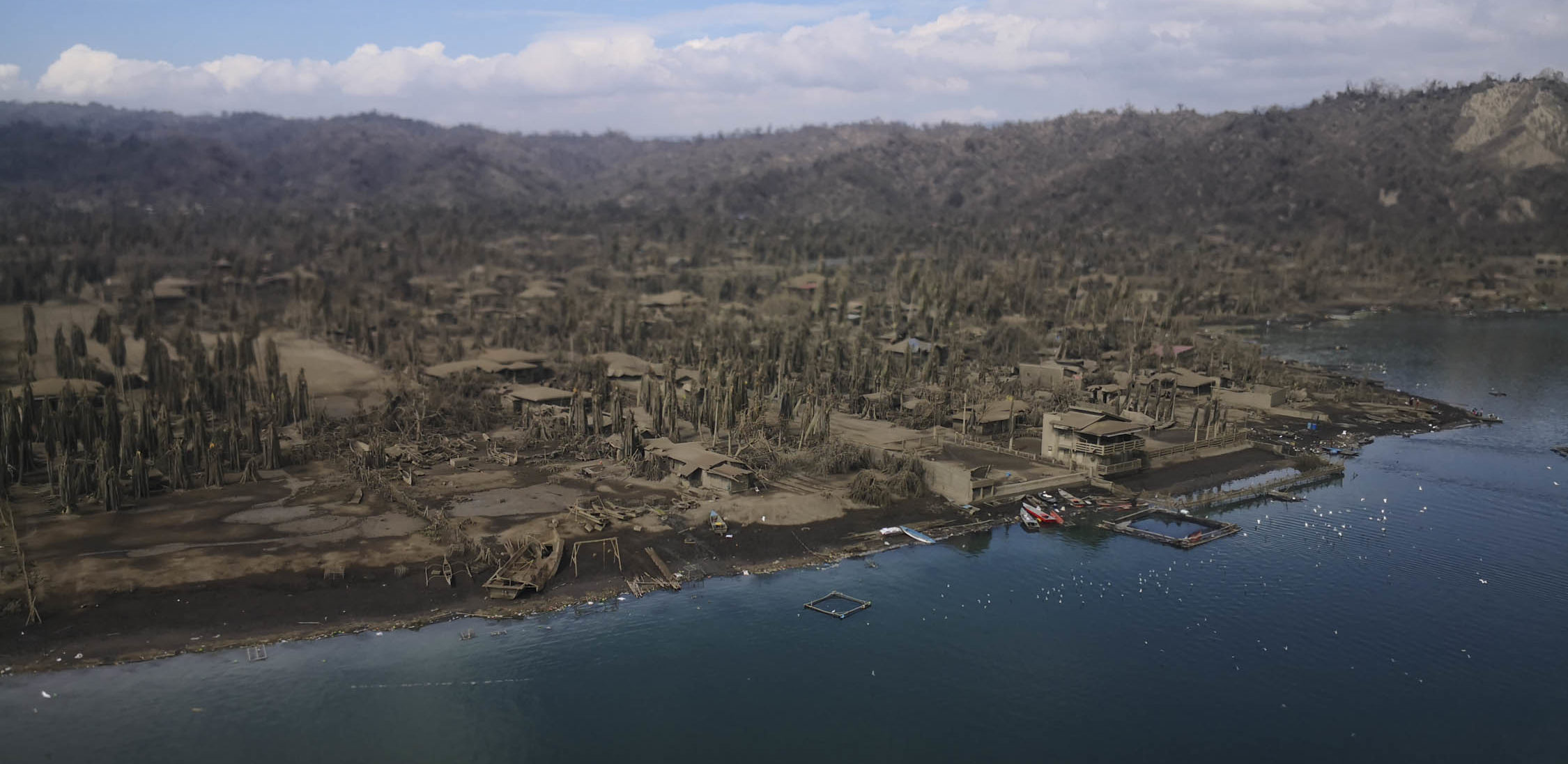
WASTELAND Once a verdant community thriving on farming, fishing and tourism, Taal Volcano Island in Batangas province has become a wasteland after the volcano on Jan. 12 spewed steam and ash, forcing its 6,000 residents to abandon the island. —CLIFFORD NUÑEZ
Tons of vegetables from the Cordillera region and other fresh harvest found their way to evacuation centers in the provinces of Batangas and Cavite, as volunteers prepared warm meals for thousands of residents displaced by the eruption of Taal Volcano.
In Alfonso, Cavite, couple Ed and Hilda Cleofe together with artist Manny Garibay opened their Luntiang Republika, a private ecofarm, to host a “crisis kitchen” serving over a thousand evacuees from Batangas.
“If you’re looking for some ‘farm-to-kitchen’ [concept], this is really it,” said Alex Baluyut, founder of the nongovernment Art Relief Mobile Kitchen (ARMK).
Baluyut, a veteran photojournalist based in Laguna province, said ARMK first set up its feeding center for more than 2,000 Taal evacuees at the Redemptorist Church in Lipa City.
Over the weekend, ARMK set up another feeding center in Alfonso.
“Only of few of them were able to bring cooking pots or utensils to at least cook the rice,” said Baluyut, after people fled from the restive volcano that spewed tall columns of steam and ash on Jan. 12.
Morale boost
ARMK, according to Baluyut, not only aims to feed empty stomachs but “to give hope and boost the morale” of evacuees.
With threats of a more destructive eruption still lurking, he said people “needed to make decisions and think clearly,” and therefore had to stay physically and mentally fit at all times.
Baluyut said they could only cater to 1,000 people at a time because they had only 50 vo¬lunteers taking turns in cooking either in Batangas or Cavite.
ARMK serves at least two meals of rice and viand, such as “tinola” (chicken stew), “pochero” (meat and vegetable stew) and chop suey (mixed vegetables), a day.
MEAL TIME Armed with ladles and large pots, volunteers (top photo) cook meals using fresh ingredients supplied to mobile kitchens they set up in evacuation centers for residents fleeing Taal Volcano’s wrath. Below, members of a religious group from Laguna province contribute their time to prepare meals for evacuees staying at Bauan Technical High School in Bauan town, Batangas province. —PHOTOS BY ANDREW LEAÑO, CONTRIBUTOR, AND LYN RILLON
“We even had to provide their plates and utensils the first time [meals were served],” Baluyut said.
Vegetables, native pigs
Crisis or mobile kitchens tend to produce less garbage, as evacuees are encouraged to reuse their mess kits every meal.
Baluyut said the tons of vegetables donated by farmers in Benguet province and Sagada, Mountain Province, lasted several days as they were made into warm and healthy dishes.
Farmworkers from Cuenca, Batangas, also donated their harvest of pineapples to ARMK’s center in Alfonso.
“Instead of canned sardines (usually given out in relief missions), we encourage donors to give fresh vegetables or even dry kitchen spices like onions, garlic,” Baluyut said.
OJ Gomez, 47, an ARMK volunteer from Los Baños, Laguna, said they were also pooling cash donations in order to buy the native pigs from farmers in affected villages in Mataas na Kahoy town in Batangas.
He said they would bring the pigs to the mobile kitchens for roasting, so these can be served as “lechon.”
“There are about 40 [native pigs] that we could buy for P140 a kilogram,” Gomez said. “The farmers said it’s hard for them to find feed and raise [the animals] at this time, given an imminent eruption,” he added.
Lessons from PinatuboIn Pampanga province, Vice Gov. Lilia Pineda on Monday said local governments and the private sector must coordinate their efforts and avoid duplication of work in the rehabilitation of Batangas province as she cited lessons from the recovery of her province from the eruption of Mt. Pinatubo in 1991.
Pineda joined the growing clamor for the creation of the Taal commission to help Batangas rise fast from the eruption of Taal and its aftermath.
“One of the lessons of Pinatubo was cooperation. But one agency has to be focused on the task of rehabilitation and in our case, that was the MPC (Mt. Pinatubo Commission),” Pineda told reporters on Monday.
She said the MPC ensured that the P10-billion allocation from the government had be¬nefited the Pinatubo victims. The MPC also increased the participation of local governments and the private sector in rehabilitating areas affected by the eruption, said Pineda, who was then mayor of Lubao town.
The Pampanga government has been sending aid to Batangas evacuees as “payback” from the Kapampangan, who also received help in the aftermath of Pinatubo’s eruption, said Gov. Dennis Pineda. —WITH A REPORT FROM TONETTE OREJAS INQ